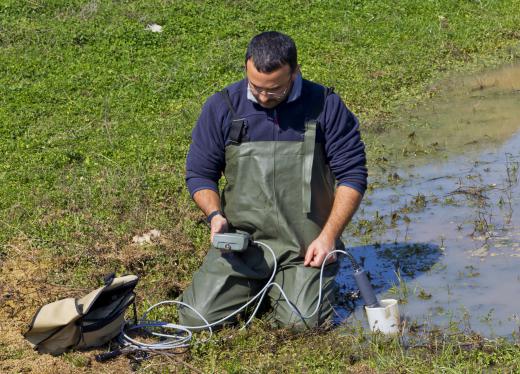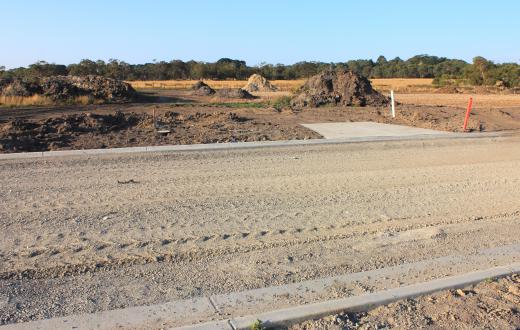What Is Groundwater Monitoring?
Groundwater monitoring is the collection of data pertaining to underground water resources. This data includes the amount and quality of the water as well as the extent and hydrology of the geological structures containing the water. The periodic depletion and replenishment of these structures, called aquifers, is recorded, taking human use into consideration. Such data helps to manage a resource that many rely on for drinking water, agriculture, and industry.
Changes in the quantity and quality of underground water resources are typically slow processes, which are hidden from ready observation. Effective studies often cover a large area over an extended time. Geological and hydrological observations form a baseline against which variations can be recorded. The measurement of variables over time are the procedures most often associated with groundwater monitoring.

Both the level and quality of aquifer groundwater are usually measured at small-diameter observation wells called piezometers. These are used over a very limited section of an aquifer, specifically to monitor water pressure. Groundwater monitoring wells in a single location can also be implemented at multiple depths, allowing for sampling and measurement over a range of elevations. The measurement of water level and pressure help analysts determine water flow patterns within the aquifer as part of the overall hydrologic cycle.

Abstraction wells provide a one-time reference for a location's groundwater quantity and quality when they are drilled. The potential amount of water that might be drawn from the well can be estimated, also. When the wells become operational as water sources, the interpretation of data becomes more difficult. Levels are affected by a recovery cycle and water quality reflects a mixture of water from a range of depths. They do provide general groundwater monitoring data, however.

Carefully placed observation wells can be used in conjunction with select abstraction wells to form a network for groundwater monitoring. The design parameters of a network typically enable the detection of changes in groundwater flow and quality as well as the assessment of specific local risks. They also provide an early warning of overuse or contamination. Equally important is record preservation in an accessible and flexible database.
Data from a network of monitor wells is often joined with river flow measurement, meteorological observation and land use surveys to assist in water resource management. Where the water is, its movement, how much is being used and for what purposes are all important components in groundwater monitoring. Effective resource management is sometimes as much an information problem as an infrastructure or policy problem.
AS FEATURED ON:
AS FEATURED ON:













Discussion Comments
It's impossible to keep all pollutants out of groundwater. That's why we need water treatment centers and why people who have wells should use quality filters to clean their water.
Since they are usually at least partly underground, septic systems and septic tanks can leak pollutants into the groundwater relatively easily if not properly maintained. Making sure home septic systems are installed properly and that they are cleaned regularly can help improve the quality of groundwater.
It's much easier and much less expensive to keep pollutants out of the groundwater than it is to try to remove them from the water. This is why groundwater monitoring is important. Quality monitoring and water analysis can give us an early warning when pollutants begin to seep into underground water.
I like well water. When the groundwater is clean I prefer the taste of the private well water over my local city water. However, we were recently advised to test our well water. After the testing was completed we decided to switch to city water for drinking and bathing. We live in the country, surrounded by farm land, and unfortunately some farmers use harmful chemicals and fertilizers when they grow crops.
Tests conducted on the water from our well and tests conducted on local groundwater showed that a high concentration of the chemicals used in agricultural pesticides were present in the samples. Fortunately, the groundwater monitoring done by the local environmental agency alerted us to the problem, and we were able to take action before the problem got any worse.
Post your comments